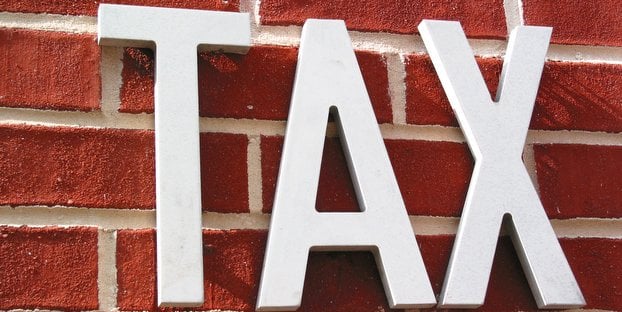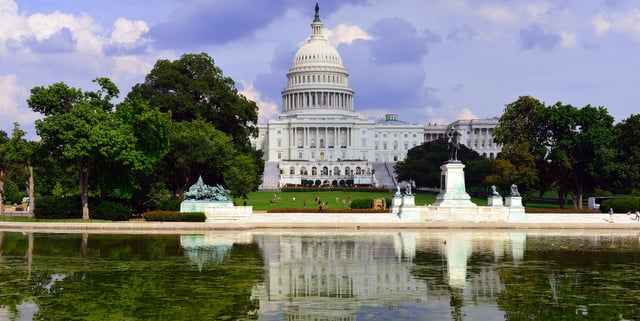
Taxes suddenly got exciting last week. The Senate barely passed a high stakes tax reform bill (H.R.1 — Tax Cuts and Jobs Act) 51-49 and a not a single Democrat voted for it. It was the largest tax reform bill in the last 30 plus years and would cut federal taxes by $1.5 trillion. The bill does a lot of things — tax brackets are changing; tax rates will be cut for individuals for the next 10 years; the child tax credit will be increased; there’s a new family tax credit; read it all right here. Of course, the big headline of the bill is that, if made law, it permanently lowers the corporate tax rate from 35 percent to 20 percent (though Trump has already hinted he still may consider pushing a higher rate than 20 percent. Cue eyerolls).
The Democrats are calling H.R.1 a tax cut for the rich and the corporate world (which it is). Republicans say giving money back to businesses will help spur the economy and the Congressional Budget Official is saying this bill will add more than $1 trillion to the national debt, which is already at $20.6 trillion ($14.9 trillion of that is owed by the public, which is you, CBB reader). Despite the vast differences in opinions, philosophies and party lines, the alcohol industry is an enormous winner with these new law proposals because on top of the corporate tax reduction this bill also includes a version of the Craft Beverage Modernization and Tax Reform Act.
From the Huffington Post:
U.S. Senator Luther Strange (Republican-Alabama) noted the bill provided a 50% reduction of federal tax on domestic brewers and distillers who produce less than 60,000 barrels a year. In September, Strange said the bill would boost his state’s craft distilleries and breweries, “revitalizing neighborhoods and creating jobs.”
After it passed, the Senate bill includes a two-year version of the Craft Beverage Modernization and Tax Reform Act, which defined mead, cuts the federal excise tax on spirits, wine and beer, allows in-bond transfers of bottled spirits and provides for the expensing of certain costs related to the aging process of beverage alcohol.
The Craft Beverage Modernization and Tax Reform Act, S. 236, amends the Internal Revenue Code, with respect to the tax treatment of certain alcoholic beverages, to:
- exclude the aging period from the production period for beer, wine, or distilled spirits for purposes of determining whether a taxpayer can expense, rather than capitalize, interest costs paid or incurred during the production period;
- reduce excise tax rates on beer and distilled spirits;
- modify the small wine producer tax credit to increase the amount of the credit, expand the producers that are covered, and specify an adjustment for hard cider;
- modify the alcohol content limitations that apply to certain wines for tax purposes;
- specify definitions for “mead” and “low alcohol by volume wine;”
- modify requirements for records, statements, and returns for certain breweries; and
- permit the transfer of beer between bonded facilities without payment of tax.
According to Politico:
The Senate bill would lower the federal excise taxes imposed on domestic and imported barrels of beer for two years; for smaller craft brewers producing less than 2 million barrels each year, the levy would drop significantly, to $3.50 a barrel on the first 60,000 barrels; and for larger companies like MillerCoors and AB InBev, the levy would drop to $16 a barrel on the first 6 million barrels, and remain at $18 for any above that.
The industry groups supporting those provisions made a lobbying push on Capitol Hill, but Republican Sens. Rob Portman and Roy Blunt carried the effort across the finish line, said Jim McGreevy, president and CEO of the Beer Institute. Other backers include the Brewers Association, Distilled Spirits Council of the United States and Wine Institute.
In addition, the Craft Beverage Modernization and Tax Reform Act would: allow for consolidated bookkeeping for brew pubs; expand the list of ingredients that could be automatically included in a beer without approval from the Alcohol and Tobacco Tax and Trade Bureau (TTB); and allow brewers to collaborate on new beers by giving them the flexibility to transfer beer between breweries without tax liability.
The bill will next head to a conference committee, where House and Senate members will reconcile differences. We’ll keep you updated if and when this becomes law. Whether you agree with these sweeping tax reform measures or not, some of these laws are throwing a lot of money back into the brewing industry (even if our country continues to go into ridiculous levels of debt).
Here’s what the Beer Institute had to say:
Jim McGreevy, President and CEO of the Beer Institute — a national trade association representing brewers, beer importers, and industry suppliers — released the following statement lauding the U.S. Senate for voting to pass excise tax reform for brewers and beer importers for two years as a part of H.R. 1, the Tax Cuts and Jobs Act:
“The Beer Institute commends the Senate on their bold vision on tax reform and for including federal excise tax relief for America’s brewers and beer importers in the Senate tax reform legislation. Federal excise tax reform for beverage alcohol is a comprehensive and critical step forward that benefits all brewers and beer importers — large and small.
“We appreciate the broad bipartisan support for federal excise tax reform for brewers and beer importers, and we thank the 300 members of the House of Representatives and 55 members of the Senate who support the Craft Beverage Modernization and Tax Reform Act and for their leadership in providing comprehensive tax relief for brewers and beer importers.
“Federal excise tax relief for brewers and importers could create an additional $320 million in annual economic growth in an industry that today supports more than 2.2 million American jobs and generates more than $350 billion in economic activity.
“We thank Senators Roy Blunt (R-MO) and Rob Portman (R-OH) for their leadership to include federal excise tax relief for brewers and beer importers in the Tax Cuts and Jobs Act, and we look forward to working with Senate and House leadership as well as the members of the conference committee and urge them to include this provision in the final conference report. “





jfmccarty says
Death, Taxes and now, BEER!